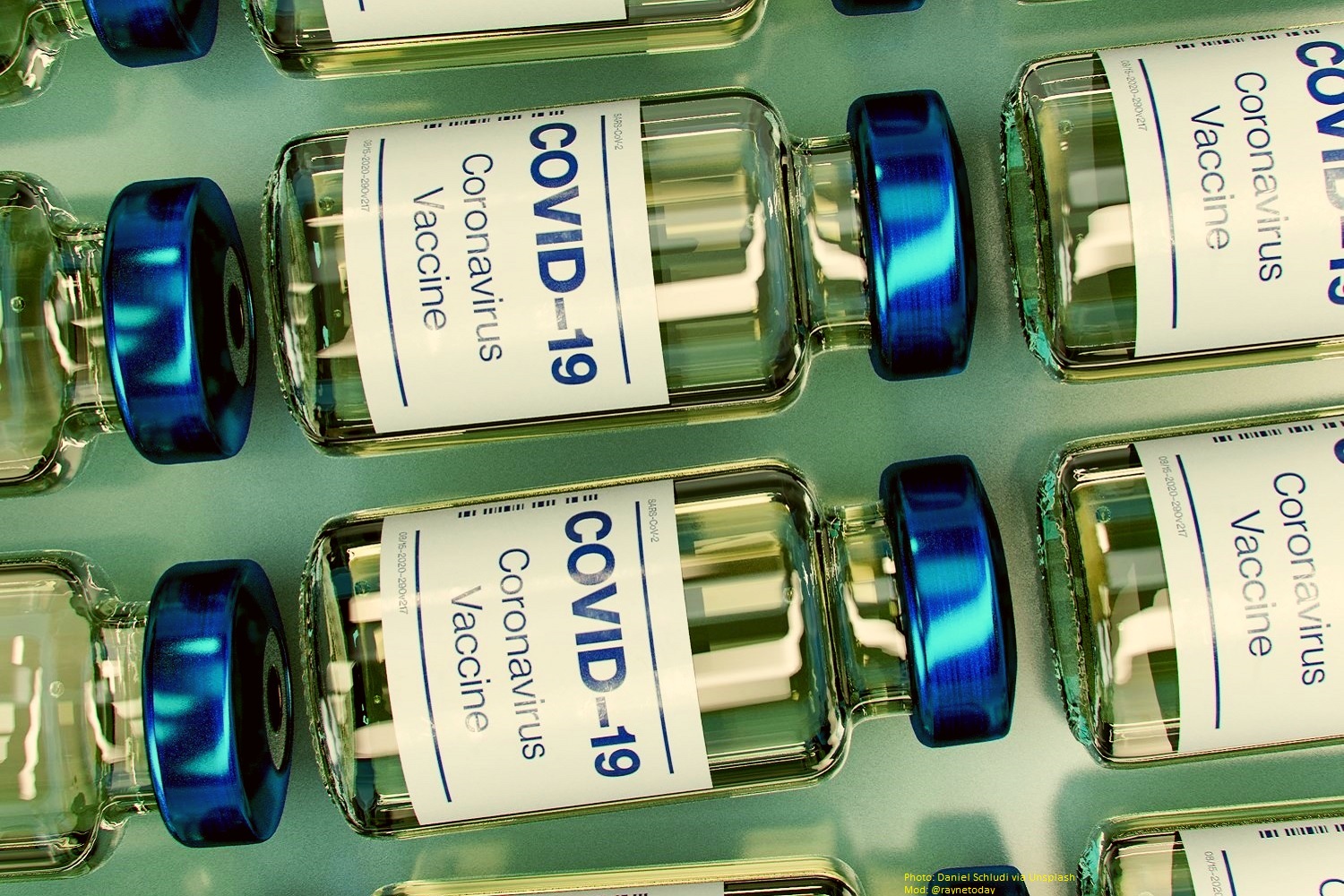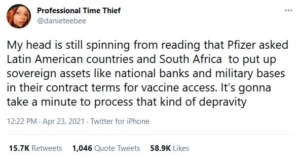India’s COVID Surge: The Curious Facets of U.S. Response
The volume and tenor of pleas for help escalated to new heights this past week as India was engulfed in the pandemic.
You’ve likely seen images of numerous funeral pyres and many graves along with sick outside overfull hospitals.
Apart from the pyres, it looks like Wuhan in January 2020, the U.S. in March 2020, and Brazil at the end of this March.
And yet there is something really wrong here, very off. The case counts and deaths are truths which can’t be escaped but the insistence the U.S. somehow is failing to meet India’s needs is off base.
~ ~ ~
All that’s left of a couple thousand word post I wrote and wrote, and then rewrote over the last several days is what remains above.
The situation over this past weekend changed rapidly, thought the angry ranting at the U.S. and Big Pharma never let up.
The Biden administration issued a couple of statements between Sunday and Monday about the steps it would take to aid India, which included COVID testing kits, PPE, oxygen, therapeutics for treatment, raw materials for vaccine production, and funding to ramp up capacity of India’s own vaccine producer, BioE.
The media did its usual weak sauce reporting.
Not a single outlet noted extremely curious facets about the Biden administration’s outreach to India:
• U.S. National Security Adviser Jake Sullivan spoke with his counterpart, India’s National Security Advisor Ajit Doval this weekend;
• There are no reports of Prime Minister Mahendra Modi contacting Biden to ask for help though they have spoken in the last 24 hours (perhaps as recently as this morning Eastern Time);
• There was scant coverage of U.S. Secretary of State Antony Blinken talks at least a week ago with his counterpart, India’s External Affairs Minister Subrahmanyam Jaishankar, regarding COVID and vaccines.
Why did the National Security Adviser play such a big role, with the White House statement issued by NSC office?
~ ~ ~
In the mean time invective against the Biden administration and Big Pharma has continued, some of it based in what looks like weak and less-than-thorough reporting.
Claims that Big Pharma has decided profits come before the lives of India’s people follow reports that Big Pharma refused to give India patents or transfer intellectual property.
Except that Big Pharma is represented in India by AstraZeneca, which is making their adenovirus-vector vaccine in country. It’s the same vaccine which has been used in Europe, and is still in FDA safety review here.
India also has its own Big Pharma in Bharat Biotech, which has developed Covaxin vaccine in collaboration with Washington University School of Medicine in St. Louis, Missouri. The vaccine left Phase 3 trials in early January.
Yet intelligent people continue to harangue the U.S. and Big Pharma about their refusal to help India with the IP needed for licensing. They retweet stuff like this:
The account that wrote this was opened only weeks ago in January 2021. There’s almost nothing in its profile to suggest this is a human with credible background education or experience; the account hasn’t been validated by Twitter. Note the number of times this has been shared by retweet or quote tweet, yet the majority of roughly 6000 tweets by this account are about pop culture.
This is the kind of social media content which ramped up tension around U.S. response to India’s ongoing COVID surge and continues to do so because it remains uncontested.
The issue the tweet focused on was vaccine manufacturers’ request for indemnification by countries which use its vaccine or licensing to manufacture vaccines. How odd that an account tweeting about beauty products and the Kardashians chose to phrase indemnification this way.
~ ~ ~
One of the reasons the U.S. National Security Adviser may be involved is the lack of an effective top-level response by India’s government to the surge. From Reuters via Yahoo:
NEW DELHI (Reuters) -India’s government has decided to leave the import of COVID-19 vaccines to state authorities and companies, two government officials told Reuters, a decision that may slow acquisitions of shots as a second wave of the pandemic rips through the country.
They said Prime Minister Narendra Modi’s government would instead aim to support domestic vaccine makers by guaranteeing purchases from them. The government this month paid Indian producers in advance, for the first time, for vaccine doses.
Under fire for his uneven handling of the world’s worst COVID-19 surge, Modi has opened vaccinations for all adults from next month but supplies are already running short.
Negotiations between countries on exports/imports are usually handled by their state departments or external affairs and not at lower state/province level. What amounts to the transfer of technology between a nation and individual states is a security risk, let alone problematic for individual pharmaceutical companies.
This is likely why the initial agreement between the U.S. and India’s national security advisers addressed shipment of supplies and other support but not vaccines, technology, or licensing.
It surely didn’t encourage the Biden administration to see how badly Modi has bungled handling the pandemic:
See chart below 👇🏽Why didn’t Government of India place firm vaccine orders like other countries did in Jan this year? Just compare the huge numbers of vaccine doses ordered by US, UK to India’s measly orders. Surely here the buck cannot be passed onto states. #COVID19Vaccines pic.twitter.com/lA3rNndvOZ
— Sagarika Ghose (@sagarikaghose) April 26, 2021
In late January, Modi indulged in a smarter version of Trump’s March 10, 2020 remark, “We’re prepared, and we’re doing a great job with it. And it will go away. Just stay calm. It will go away.”
Addressing the World Economic Forum’s online Davos Agenda Summit, PM Modi said India has beaten all odds to battle the pandemic. “When Covid-19 arrived, India had its share of problems. At the beginning of last year, several experts and organizations had made several predictions that India would be most affected by the pandemic. Someone had even said that 700-800 million would be infected and someone had said that over two million Indians would die from the pandemic. Looking at the condition of countries with better health infrastructure, the world was right in worrying about us,” he said.
“India, however, took a proactive public participation approach and developed a Covid-specific health infrastructure and trained its resources to fight Covid,” the PM added.
This was a mere 12 weeks ago; it was complete hogwash and hardly the stuff needed to instill confidence. India’s situation deteriorated greatly after Davos because Modi failed to take any effective measures to mitigate COVID’s spread in advance of a weeks-long major religious holiday, the Hindu observation of Kumbh Mela.
Nor has it helped develop trust in Modi and his government when they have demanded Twitter hide tweets critical of Modi’s COVID response from Indian public view.
Faith in the individual Indian states is tenuous at best; there are far too many anecdotes about state governments lying about COVID response and health care resources.
my grandmother lives in his state and just got covid, and she is among 1000s of people. this guy has been forcing labs to stop testing and undercounting cases, and then comes on here to blatantly lie about it. https://t.co/F3IqEDX2IH
— tanvi (@Tanvim) April 26, 2021
This is an insane level of denial:
Amid reports of patients and hospitals struggling to find and maintain oxygen supply, Uttar Pradesh Chief Minister Yogi Adityanath has asked officials to take action under the National Security Act and seize the property of individuals who spread “rumours” and propaganda on social media and try to “spoil the atmosphere”.
Mr. Adityanath asserted that there was no shortage of oxygen supply in any COVID-19 hospital – private or government-run – but that the actual problem was blackmarketing and hoarding.
The state of Uttar Pradesh is expending more resources on suppressing “rumours” than on demonstrating to the public there is ample oxygen and other resources for COVID therapy.
~ ~ ~
This level of narcissism, gross incompetence, and denial in another country’s leadership isn’t something the U.S. can fix. Obviously the U.S. is still struggling with cleaning up after its own run-in with a white nationalist populist who was narcissistic and grossly incompetent as well as corrupt.
We’re still playing catch up because the Trump administration obstructed a peaceful and efficient transition, what with Trumpist GSA Administrator Emily Murphy refusing to turn over the keys to Biden’s team after the election. We’re not as far along as we should be with vaccinating the public because there was no federal COVID program when Biden was inaugurated and insufficient amounts of vaccine had been ordered by Trump.
Not to mention the January 6 attempt to overthrow the government and the Big Lie which continues to interfere with outstanding transition issues.
But the U.S. somehow bears some responsibility for the mounting disaster in India?
Otherwise smart people are trashing both the U.S. and their own cred with demands to remedy Modi’s manifold failures; others insist immediate action in spite of global inaction for decades on pandemic preparedness.
Industry is BS-ing us saying, hey it’s not about IP, we won’t enforce our patents no, well, guess what? Production is encumbered by patents you don’t own, what company in India, South Africa wants to set up production now only to have you grab back rights you do own in 2 yrs? 9/
— Gregg Gonsalves (@gregggonsalves) April 26, 2021
Where was all this concern when Trump killed the pandemic monitoring program instituted under Obama?
Where is the awareness of the security risks posed by a failing state like India, which already has patents?
~ ~ ~
There’s one more element in this mix which may explain the presence of the National Security Adviser in the aid offering to India.
Granted, I’m not certain how to get a handle on the risk involved, but some of the intellectual property and technology isn’t as benign as a Play-Doh Fuzzy Pumper or an Easy-Bake Oven. It can be militarized and its output weaponized.
When talking about some of the COVID vaccines, we’re talking about development which began as military programs. Research for adenovirus-vector vaccines now used against COVID began in the 1950s inside the Defense Department; a vaccine was developed and distributed to military personnel for more than two decades to prevent acute respiratory disease associated with adenovirus infections. This vaccine didn’t become part of the scheduled vaccines American civilians receive, just as they didn’t receive anthrax vaccines.
How much of the limitations we have seen tossed around in social media, attributed to Big Pharma greed, are really carefully parsed concerns about the potential for the vaccine IP and technology to be acquired by hostile entities for weaponization?
Can we really blame any legitimate pharmaceutical company for expecting indemnification against the misuse of their product, IP, or technology considering this kind of exposure? Let alone the potential claims against them for extremely rare side effects which may be worsened by incompetence in treatment, ex. treating unusual clotting events with blood thinners which may exacerbate the clotting.
But this goes to the lack of global systemic preparedness for pandemic. It’s a global problem, not one for which the U.S. bears sole responsibility.
Imagine the possible blowback from questionable social media accounts with negligible provenance should the U.S. under the Biden administration choose to arbitrarily “Free the patents!” as so many demanded this past week over social media, without due diligence about the security risks these new vaccine technologies pose.
This pandemic requires us to imagine this and a lot more. We need to think systemically, more deeply and widely.
This includes thinking ahead to where will the next crisis begin, because it’s only a matter of time.




![[image: Eugenia Vlasova via Flickr]](https://www.emptywheel.net/wp-content/uploads/2016/02/Pacski_EugeniaVlasova-Flickr-300x200.jpg)